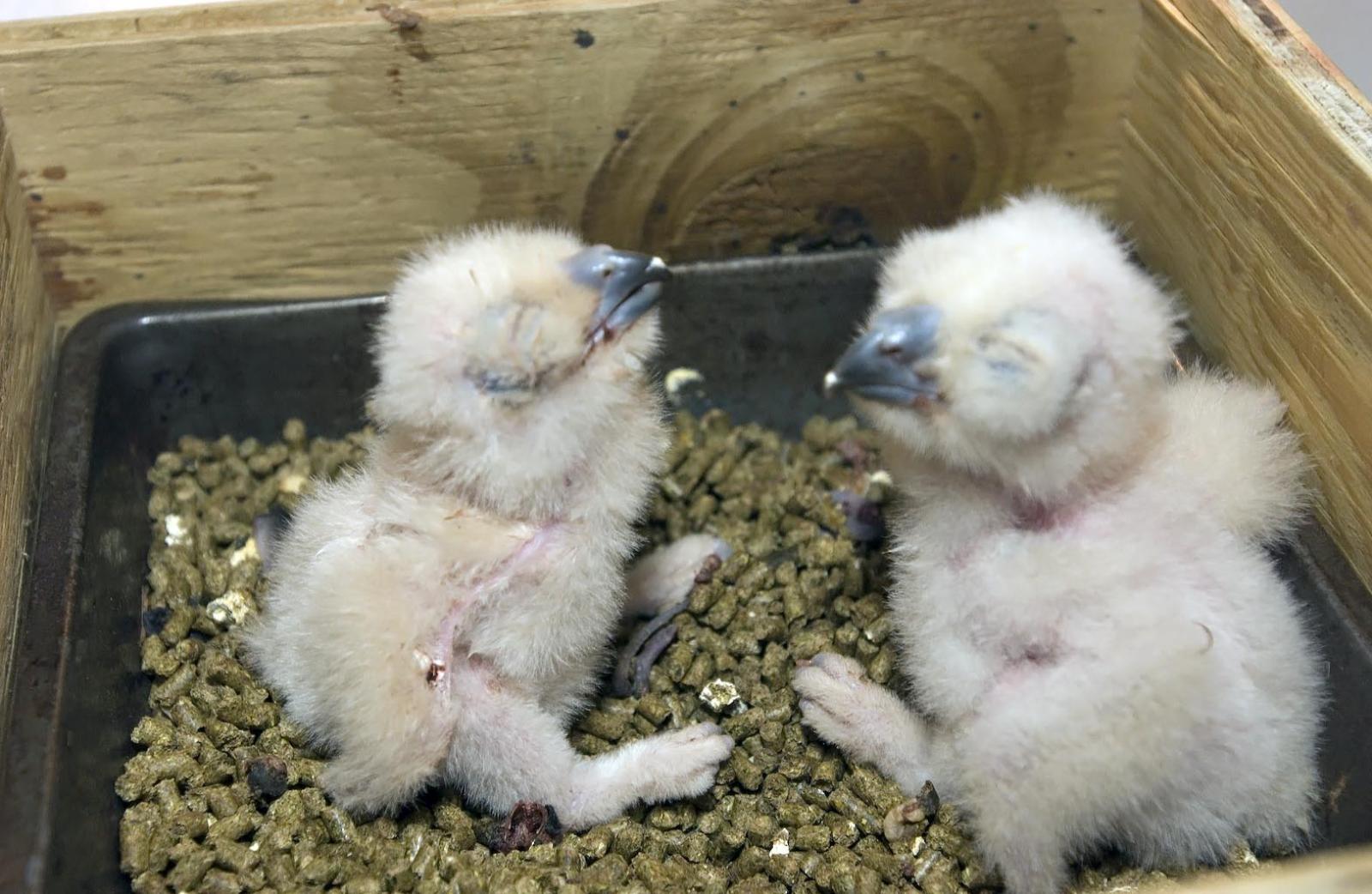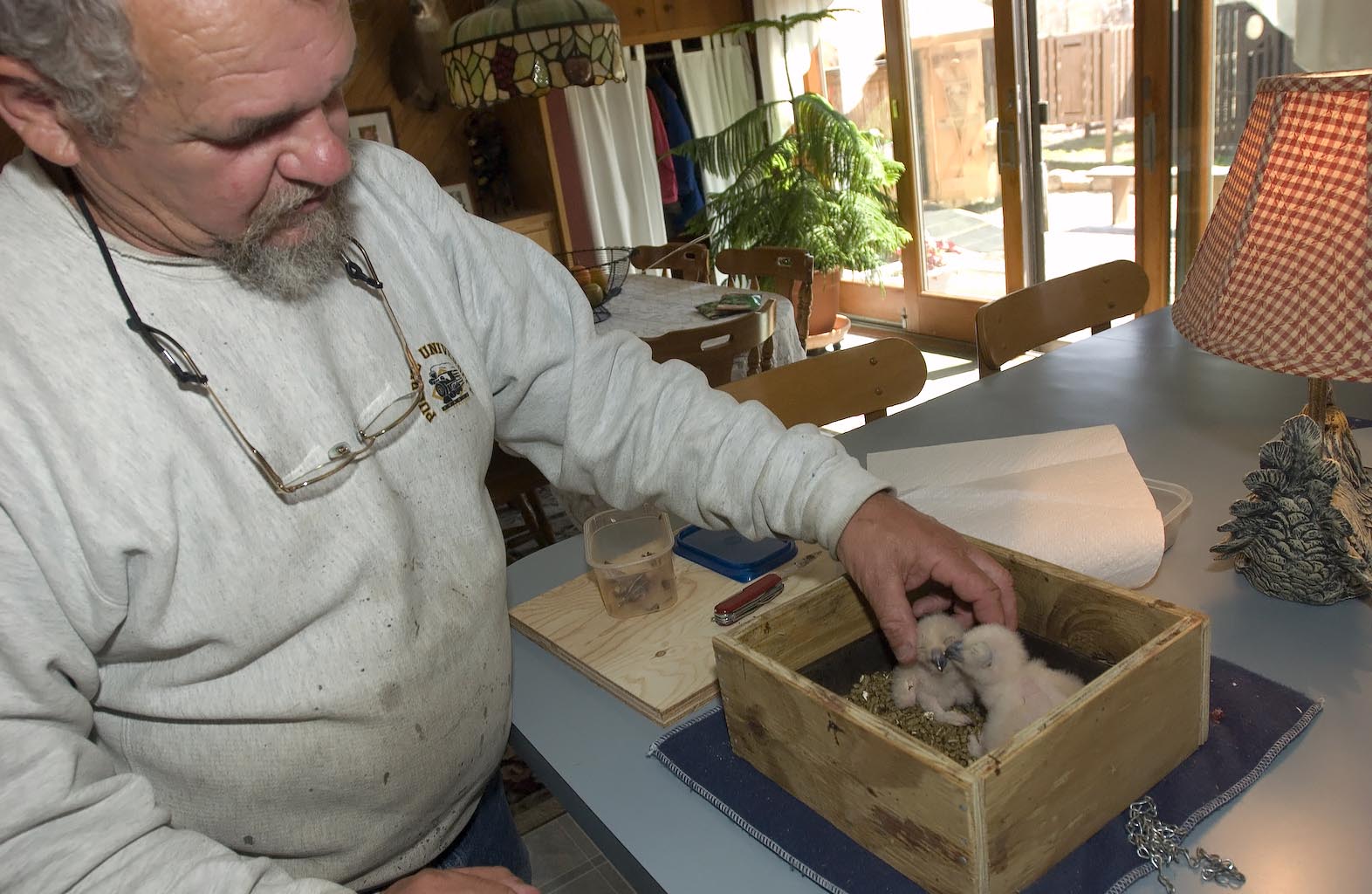Two baby owls, only a few days old, believed to be the only owls ever born in captivity on the Island, are doing well on the counter top of Gus Ben David’s kitchen in Edgartown.
The little fuzzy creatures, not much heavier than a pile of feathers, are eating well and gaining weight.
For now, they are living in an eight-inch square box slightly bigger than a shoe box. The box sits on a heating pad set between 84 and 87 degrees.
The young parents aren’t that far away. They are Mystic and Angel, two three-year-old adult eagle owls that Mr. Ben David has had for a while. The couple reside in a large dark brown wooden cage outdoors.
Mr. Ben David runs World of Reptiles and Birds Park, off the Edgartown-Vineyard Haven Road. He raises all kinds of animals but this is the first time he has ever raised eagle owls from eggs.
Eagle owls are nighttime animals. They are found in Europe from as far north as the Scandinavian countries all the way south to Spain and as far east as China. They feed on rats and mice, and are more often associated with remote forest areas.
Mr. Ben David already for years has had an American bald eagle and a golden eagle, and a wide variety of interesting and exotic pheasants and waterfowl. But the two newest arrivals on the kitchen counter are the center of the universe in the Ben David homestead.
Like any parent, Mr. Ben David hasn’t had a good night sleep all week since the two large dustballs arrived. He was anxious even when the mother owl was incubating the eggs. The new arrivals are just too much out of the ordinary for a man who spends a lot of time with big and little animals.
What sets these residents of Mr. Ben David’s house apart from all the other snakes, turtles and birds is that they are not only the first owls hatched in captivity on the Vineyard. Even more significantly, they are believed to be the first eagle owls bred in New England.
Eagle owls are native to another hemisphere. They are among the largest owls in the world. There may be more than 100 eagle owls in captivity in the United States. The animals are ideal for education use because of their size. They are like horned owls in appearance.
During this critical period in the life of these little birds, Mr. Ben David said he has had many telephone conversations with experts.
Mr. Ben David and his wife Debbie coordinate their daily chores to keep the youngsters fed 24 hours a day.
Owls normally eat at night, so even in captivity the babies are no different. Mr. Ben David said he gets up and feeds them as much as three times a night. In the weeks ahead, he said he hopes to shift the birds’ meal time to daylight.
“Aren’t they the cutest things you ever saw?” asked Mrs. Ben David, as she looked into the box. Mrs. Ben David said she is charged with feeding them during the day.
Their meal is ground-up mice.
For more than a month, Mr. Ben David admits to having been a ball of nerves.
From the start, he hoped Mystic and Angel would become a breeding pair.
“You don’t often get a breeding pair in captivity,” Mr. Ben David said. Even if you put a male and female eagle owl together, there is no assurance what will happen. When they breed, they do it only once a year.
The arrival of two eggs came as a welcome surprise, Mr. Ben David said. He still wasn’t sure what was going on, however. They may not have been fertilized. Incubation takes from 30 to 34 days, so throughout the month there was uncertainty. Mr. Ben David said he checked the owls often to see how they were doing.
The hatching of the first egg came on May 1, and the second on May 3. Every day since, Mr. Ben David has lived on eggshells.
“We are not out of the woods yet,” he said. “This is one day at a time.”
Mr. Ben David already is thinking a bit about the future of these two little chicks. By raising them within a close atmosphere of humans, these birds will likely be more acclimated to a life of education and public viewing.
He said he hopes to let visitors see the little birds. As long as the owls are healthy, Mr. Ben David said, he’d like people to enjoy the magic of watching them grow.





Comments (1)
Comments
Comment policy »